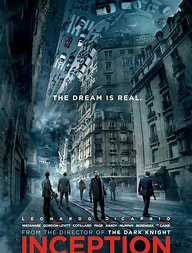Christopher Nolan’s Inception is one of the most ambitious and intellectually stimulating films of the 21st century; a unique blend of science fiction, psychological thriller, and heist genres, the film not only questions the nature of reality but also provides audiences with an intense, emotional, and visually stunning experience Played by Leonardo DiCaprio, Dom Cobb is a skilled “extractor” who can enter the subconscious of others to steal their thoughts or implant new ones. Dom Cobb’s personal anguish and professional expertise combine to give the story its emotional heft
It transports viewers to a dream world where time, space, and the laws of physics are twisted at will. Nolan’s imaginative genius is evident in the creation of multi-layered dreams. Each dream have its own rules and aesthetics. The scenes of shrinking cities, the fight scenes in zero gravity, and the blurred boundaries of reality—all present a beautiful balance of practical effects and CGI. Every frame appears carefully crafted, a testament to Nolan’s precision and vision.
The film’s story is structurally complex, relying on “dreams within dreams” and thought implants in the subconscious—i.e.Inception— deeply explores the concept of the “successful.” While its complexity may initially seem overwhelming, Nolan gradually unravels the story, keeping the audience emotionally engaged. The film is as much about Cobb’s internal struggles as it is about the mechanics of a high-tech heist. Struggling with the guilt surrounding the death of his wife, Mal (Marion Cotillard), Dom Cobb’s image constantly haunts his subconscious.
This emotional struggle makes the film both human and deeply moving. The cast’s performances make the film even more effective.: Joseph Gordon-Levitt’s Arthur, Cobb’s trusted companion, exudes a steady, charismatic presence; Ellen Page’s Ariadne, a gifted “dream architect,” plays a crucial role in guiding Cobb out of his mental labyrinth; and Tom Hardy’s Eames offers a balance of humor and intensity. Each character contributes significantly to the story, and DiCaprio’s emotional weight, depth, and intensity carry the film.
Hans Zimmer’s music is another outstanding aspect of the film. His resonant, powerful sounds—particularly in “Time”—make the film’s themes of memory, loss, and time even more poignant. The music not only enhances the thrill but also strengthens the emotional depth of the quieter moments. Rarely does music feel so integral to the story, and Zimmer’s composition achieves just that.
In terms of subjects, Inception. It explores profound questions such as reality, memory, and identity. It forces viewers to consider the extent to which our perceptions are influenced by our subconscious. The film’s infamously ambiguous ending—in which Cobb leaves the spinning top behind—intensifies this philosophical tension, leaving viewers to ponder it for a long time.


